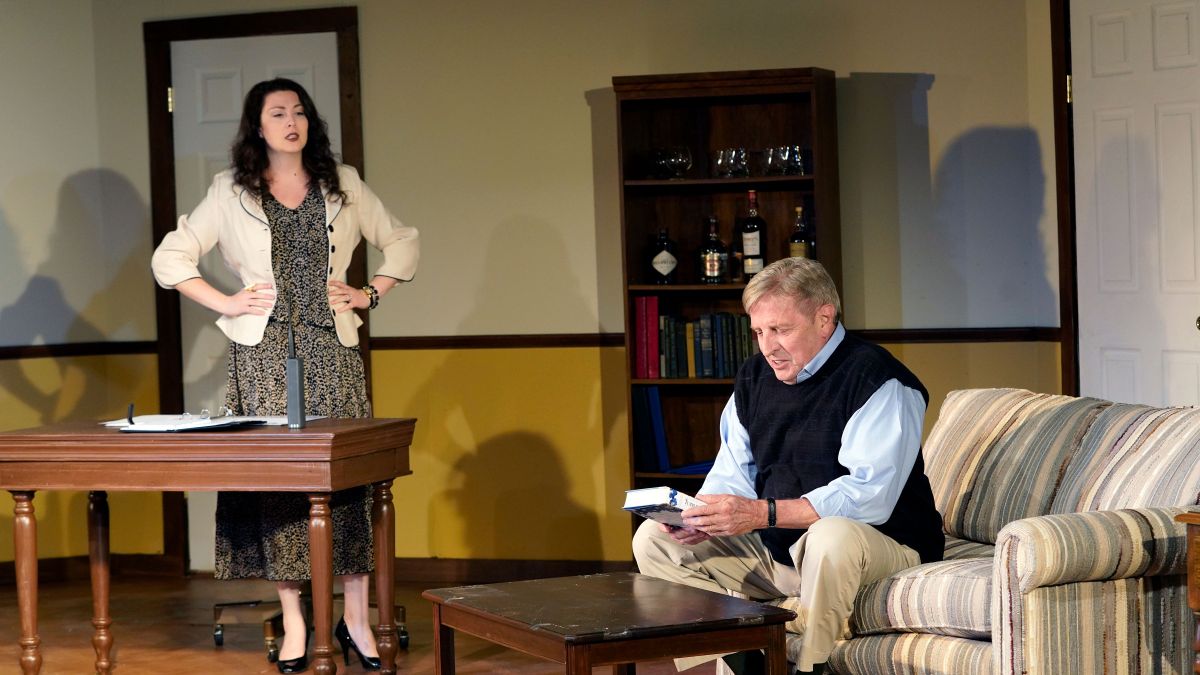OFFICE HOURS: Six Actors; Sixteen Characters; Six Stories in Search of a Laugh
A Theater Review by Julinda D. Lewis
At: CAT Theatre, 419 No. Wilkinson Rd., RVA 23227
Performances: June 7-22, 2019
Ticket Prices: $23 General admission; $18 RVATA Members; $13 Students
Info: (804) 804-262-9760 or cat@cattheatre.com
CAT Theatre’s 55th season has featured some interesting productions and some novel premises. The season opened with Boeing, Boeing, a French farce from the 1960s, followed by A Doublewide, Texas Christmas¸ written by the trio of Jessie Jones, Nicholas Hope, and Jamie Wooten who also wrote The Savannah Sipping Society that is currently playing at Swift Creek Mill Theatre. The new year brought a revival of Becky’s New Car, which I first saw some years ago at Hanover Tavern – both times I was one of those selected from the audience to assist “Becky” with her onstage wardrobe change. Earlier this spring they offered a musical comedy, BINGO! that included audience participation with real bingo cards, markers, and prizes. The final offering of this season is Office Hours, a comedy by Canadian playwright Norm Foster.
Office Hours is a series of six vignettes, each set in a different office in the same city on the same day, near quitting time. A cast of six versatile actors plays sixteen different characters with great energy and enthusiasm, but with varied levels of success. The first act, consisting of four scenes, seemed to drag at times, but I’m not sure whether it was due to Andrew Bryce’s direction or Norm Foster’s script. Maybe Canadian humor is different from ours. At any rate, the second act seemed to hit the laughs more accurately, and the play ended with a surprise twist I truly didn’t see coming.
The six scenarios are separate but intertwined. Hints and clues are sprinkled throughout that help keep the viewer engaged and provide a sense of smug satisfaction when the plot twists are revealed. Throughout the various scenes characters refer to the beautiful office space and the nice furniture. This provides an unintentional running joke as Hunter Mass’s set looks like a collection of mismatched thrift store items: a desk; a sofa; 2 or 3 chairs in different styles and sizes; a bookcase that doubles as a bar; 3 small tables. The office desk and chair seem too small, and when one or two of the character remark on its large size and the general tidiness of the office I wondered how they could do so with a straight face. There are also two doors, two tall windows, one of which has a latch that allows for access to a ledge, and a picture on one wall that is changed at the beginning of each scene.
For some inexplicable reason, there are different styles and different eras of telephones in each office scene, but the furniture remains the same, and even though the set is carefully rearranged for each scene, there is too little to distinguish the various scene. Oddly, on the night I was there, there was a noticeable but inexplicable dip in the lighting near the top of the first few scenes. Chris Stepp did the lighting and sound design, and while there were interesting and tuneful musical selections between scenes, I think more could have been done with the lighting to make each office unique.
Running themes that tie the separate scenes and characters together include the office setting, the phones, the furniture, and most interestingly, ledge jumper, a leather bound Day-at-a-Glance planner and a thick book by an erotic novelist who uses the pseudonym Margaux Kenyon.
Bill Blair is one of the more imposing members of the cast, and makes a lasting impression as Warren Kimble, a on-air journalist who is demoted as the result of age-ism and Lloyd Penny, the seemingly hen-pecked husband of a domineering wife and father of two sons: one a gay lawyer and the other a straight figure skater.
PJ Freebourn’s characters include an unnamed One-Armed Man and a shallow cheater named Mark who concocts the most amazing excuses for his infidelities and tries to use them to manipulate his young wife, Ellie.
Madeleine Gish played three very different character. In the first scene she was Pam Gerard, the overly confident and self-promoting production manager who demoted Warren Kimble. She next appeared as Ellie Young, the savvy young wife who hired a private eye to document her husband’s infidelities, and finally Sharon Freeman, a love-starved psychiatrist looking for to a long awaited weekend tryst, who put her own needs above those of her client who inconveniently decided to end their Friday afternoon session on the window ledge of her office. Gish did a great job making each of her characters distinct.
Hogan Holt also played a trio of characters, but my favorite was Artie Barnes, the overweight jockey. Foster, the playwright, seems to like tossing a monkey wrench of realism or tragedy into the midst of his most comic moments, and in the case of Artie he did not disappoint. It seems that during one race, Artie’s horse suffered a heart attack and died on the track. Yet Artie, who fluctuates in and out of denial at the drop of a hat – in his case a slightly bedazzled and bedraggles cowboy hat—insists he’s a svelte 112 pounds.
Paige Reisenfeld plays both Francine Majors, a frustrated production partner, and Rhonda Penny, the mother of the gay lawyer who insists that gay sons are the result of a domineering mother. In one of the funniest scenes of the night, she brings lunch to her son’s office, in an oversize picnic basket. The food choices inside warn us that something is not quite right with her: a large jar of giant gherkins (pickles), a cucumber, orange-aid, a polish sausage, and an uncooked eggplant. Her husband carries a bag with a McLobster sandwich. (I don’t know if that is a real thing and didn’t dare check!)
Joel White’s character included the gay son and a has-been movie director, Bobby Holland with an obvious drinking problem who tries to pitch a new project that sounds like a barely doctored revival of the Tarzan story.
There is a lot going on, and I enjoyed following the twisting threads of the various stories and discovering how they were connected. Yet, with all that – and a pretty good cast, to boot – Office Hours falls short of the comedic gem it wanted to be.
Julinda D. Lewis is a dancer, teacher, and writer who was born in Brooklyn, NY and now lives in Eastern Henrico County.
———-
Photo Credits: Jeremy Bustin Photography


One thought on “OFFICE HOURS: QUITTING TIME”